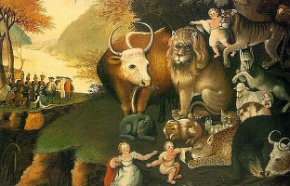Animals in the kingdom

Will there be pets in heaven? It’s a not uncommon question among Americans, who love their pets and over a lifetime possess a succession of them. Will there be animals in heaven? More to the point, will my beloved Merle or Lucinda or Marley or Sassy be in heaven?
The complexion of the question changes considerably in light of recent accounts of the afterlife, which emphasize that God will create not only a new heavens but a new earth. Ultimately, “in accordance with his promise, we wait for a new heavens and a new earth, where righteousness is at home” (2 Pet. 3:13). Last month I discussed a spate of recent books that affirm the transformed new earth. These books, representing what we might call the new account of the afterlife, take seriously a rich set of biblical texts which affirm that the material creation will not pass away but will finally be taken up into God’s eschatological work and be transformed as the dwelling place of resurrected human beings.
Read our latest issue or browse back issues.
And not only human beings. Consider Isaiah 11:6–9, which looks ahead to the eschaton, where “the wolf shall live with the lamb, the leopard shall lie down with the kid, the calf and the lion and the fatling together, and a little child shall lead them. The cow and the bear shall graze, their young shall lie down together; and lion shall eat straw like the ox. The nursing child shall play over the hole of the asp, and the weaned child shall put its hand on the adder’s den. They will not hurt or destroy on all my holy mountain; for the earth will be full of the knowledge of the Lord as the waters cover the sea.”
In somewhat less poetical language, Paul assumes that the whole creation (presumably including animals) is waiting “with eager longing for the revealing of the children of God . . . in hope that the creation itself will be set free from its bondage to decay and will obtain the freedom of the glory of the children of God” (Rom. 8:19–21).
As Edward Hicks’s famous Quaker paintings suggest, the future peaceable kingdom will include a vast array of animals as well as plants. As the Bible and Christian tradition repeatedly attest, creation itself praises God, and apparently this praise will join that of angels and human beings and continue into eternity.
I have long thought that Gerard Manley Hopkins’s poem “Inversnaid” most astutely captures this Christian theme of creation’s ongoing, natural praise of God. As kingfishers “catch fire” and dragonflies “draw flame,” each “mortal thing does one thing and the same.” It lives out its created essence so that it “speaks and spells” its God-given self, implicitly declaring, “What I do is me: for that I came.”
All this confirms a new creation replete with animal life, a zoological phantasmagoria of dazzling and glorious dimensions. But it does not necessarily affirm that particular animals are resurrected. It leaves open the question of whether or not a specific pet or pets will indwell the peaceable kingdom.
After all, any dog lover (to concentrate on a single but representative species) knows that all dogs are very much alike, at least more thoroughly alike than are individual human beings. They are all concentrated on the sense of smell. They all play a limited repertoire of similar games. They eat the same foods, across all breeds. In short, dogs are not creatures possessing culture. Or perhaps they do possess a very rudimentary culture, but it is a single culture; they do not create—as do people—an array of differing cultures. All this means that dogs (and animals in general) are not as individuated as are persons.
Accordingly, perhaps the new earth will be indwelt by the quintessence of dogs and cats and so forth. Perhaps we will know and commune with dogs and cats in the new creation, but they will be perfect representations of the species—not resurrections of the particular dogs and cats we know in this present time and realm.
On the other hand, surely there can be no such thing as an overabundance of life in the new creation, which is to say there would be “room” for resurrected pets, no matter how many one owned in a lifetime. This seems more intuitively satisfying. It is, after all, particular dogs that we have loved and treasured as companions. We love given, specific dogs and not simple “dogness.” I would like to meet again my deceased smooth-coat collie, Merle, and him more than some generic dog, however brimful of perfection.
But the future world, like the present, is not a creature of my preferences. So who can say? I at least cannot definitively answer the question of whether or not my (or your) pets will join us in the afterlife. But I am confident that the new creation will include animals of a wide variety, and will in any event be too wondrous for words.






